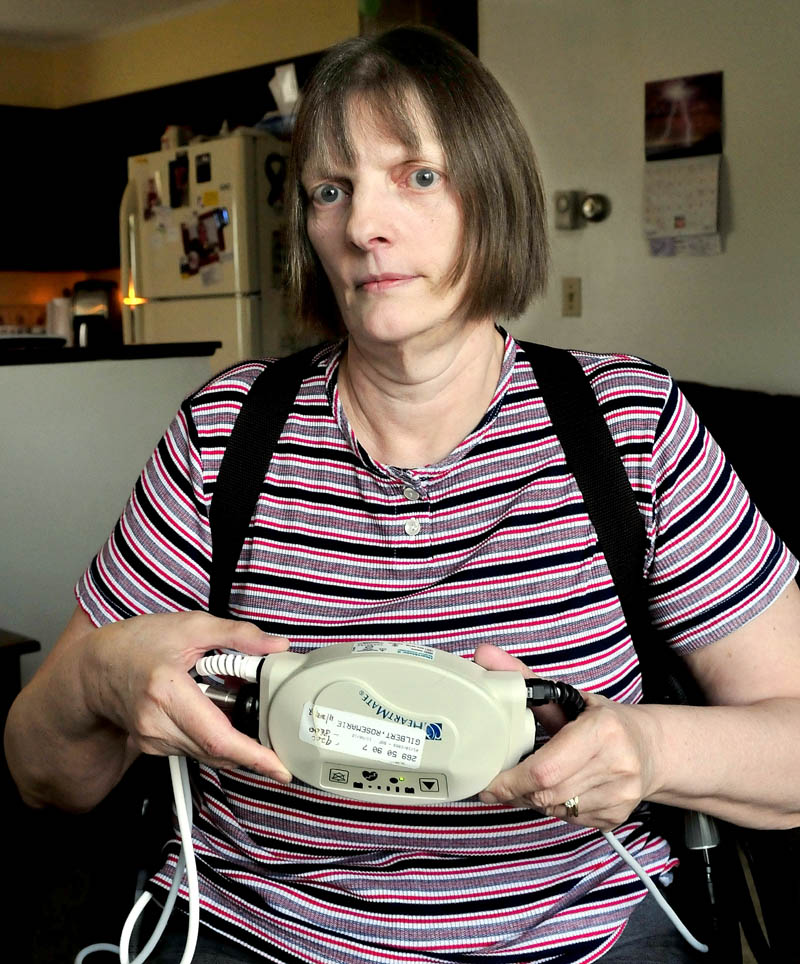Rosemarie Gilbert is not afraid to die, but she’s not ready to go either.
There are lots of things she wants to do first.
“I enjoy camping,” she said, motioning to her backyard.
“That’s my big camper out there. It’s beautiful inside. I could even go back to hunting again, fishing. I tried knitting, crocheting. That’s not me.”
She laughed. “I love to read books. I read romance, mysteries. I like the old, old books. ‘Jane Eyre’ is my favorite, favorite book of all time.”
We were sitting in her tidy, rural Winslow home Tuesday where she waits, day after day, for a new heart.
“It could be next week. It could be a couple of years from now,” she said. “You never know. It’s when a compatible heart becomes available.”
Gilbert, 60, has congenital heart disease. She underwent surgery Nov. 6 at Brigham and Women’s Hospital in Boston to be connected to a Left Ventricular Assist Device, or LVAD, as she calls it. It’s like a mechanical heart that takes blood from a lower chamber of the heart and pumps it into the body and vital organs, just as a healthy heart would.
“The left side of my heart is not working,” she said.
She showed me an instruction book from the hospital that she plans to give to Winslow rescue workers when she meets with them this week. It says that if they respond to her house in an emergency, they will not be able to get a blood pressure or detect a pulse because she has none.
She wears a control box on her abdomen that connects to tubes going into her heart. She also carries a holster with two battery packs that power the box.
And if she leaves the house, she must carry a black bag that contains an extra control box and batteries.
This smart, funny, upbeat woman emailed me the previous day, not so much to publicize her story, but to ask for help in getting a message out.
“I was curious to see if you might be interested in doing a piece for your paper on the importance of being a donor in Maine,” her email said. “There is a definite lack of organs being donated to help those needing transplants here in our state.”
Gilbert, who was a certified nursing assistant for many years, knows only too well the desperation of those needing new hearts, lungs, kidneys, eyes and other organs.
Her brother, Nathan Lake, died of heart disease in 1997 at 47. Her son, Robert, died last year on her birthday, Jan. 10, from heart disease. He also wore an LVAD. He left behind his 26-year-old wife, Jessica, and their 4-month-old son, Elijah.
Robert was an organ donor.
“He donated his eyes and a lot of other parts,” she said.
Rosemarie also is an organ donor. In fact, she became one years ago, long before she was diagnosed with heart disease. Her reason is simple: She wants to help save a life.
To become an organ donor, a person fills out a form when renewing a driver’s license or registers at OrganDonor.gov. More information is available at New England Organ Bank at www.neob.org or 800-446-6362.
Rosemarie was diagnosed with heart disease seven years ago when she was 53.
“I was coughing at night. I thought I had a bad cold and I wasn’t sleeping.”
She went to the emergency room, had a chest X-ray and was told she was in heart failure.
“Three days later, I had a pacemaker.”
She ended up in a Waterville hospital Oct. 23 last year. Six days later she was transferred to Maine Medical Center in Portland. On Nov. 6 she was taken to Brigham and Women’s in Boston.
The doctor said she would not live another week and should call her sons, Jason, 37, and Matthew, 30, to her side.
When she was told she was going to die, she reminded doctors to give her organs to those who need them. After having the surgery Nov. 14, however, she survived.
“It’s not common, but it’s becoming more common,” she said of the surgery and heart device. “There are a few of us in Maine that have it.”
She came home to Winslow Dec. 6 and got stronger with help from her husband, James, and her sons.
As she told me her story, James arrived home and was greeted at the door by their chocolate Lab, Annie. After exchanging pleasantries, I asked James what he would like to say about his wife.
“She’s a motivator. She’s my rock, I know that. I told her that back when she was in Boston. I said, ‘I don’t want to go through life without you,’ so maybe that helped her to go through the operation. I care for her deeply, and I’ll take care of her as long as I can.”
In her good-humored way, Rosemarie finishes his sentence as if she were singing a song:
“And if that ain’t love, I don’t know what is.”
Amy Calder has been a Morning Sentinel reporter 25 years. Her column appears here Mondays. She may be reached at acalder@centralmaine.com
Send questions/comments to the editors.




